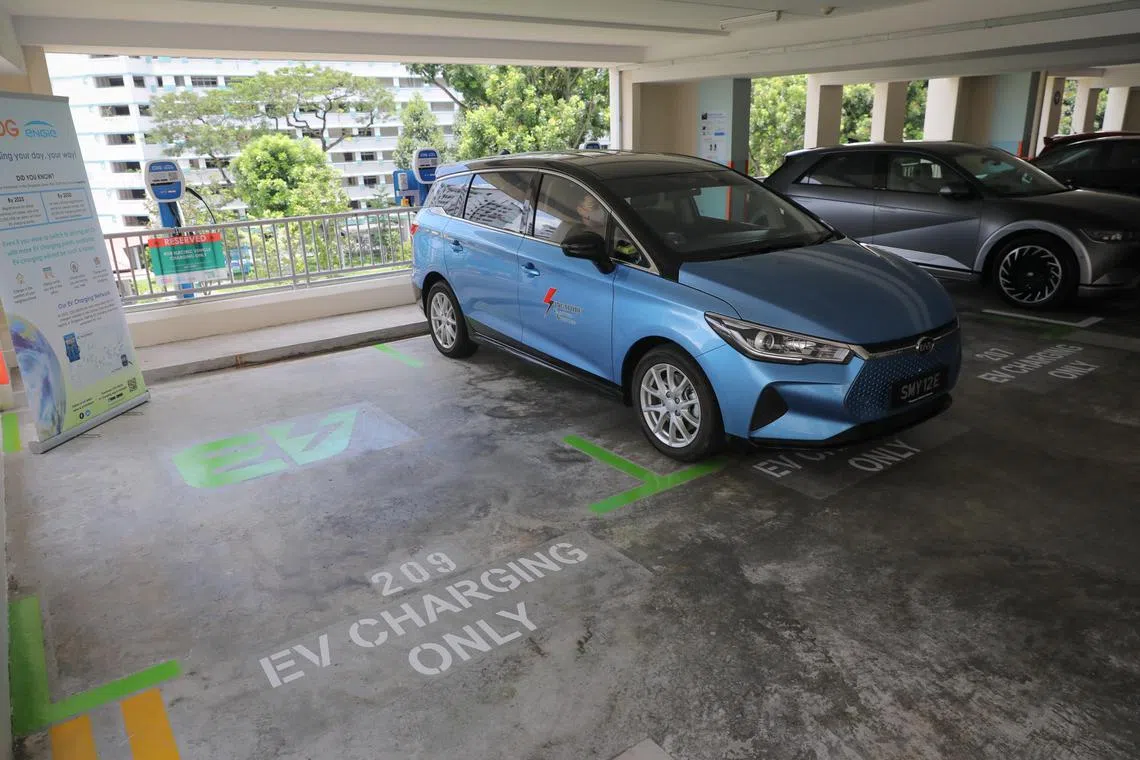Only 30 EV chargers set up in HDB carparks since January, but LTA says it can meet target for 2023
Sign up now: Get ST's newsletters delivered to your inbox

By 2030, the target is to have 60,000 EV charging points across Singapore with 40,000 of them at public carparks.
PHOTO: ST FILE
SINGAPORE - Just over 30 new chargers for electric vehicles (EVs) have been installed in 12 Housing Board carparks this year, a fraction of the target set by the Land Transport Authority (LTA) of having 2,000 charging points in more than 700 HDB carparks
However, LTA said it is on track to meet the target.
The chargers will be built by five companies, which were awarded 10-year contracts in November 2022 to roll out at least 12,000 EV chargers in nearly 2,000 HDB carparks by the end of 2025.
ChargEco and Charge+ were the first two of the five to launch their EV chargers in HDB carparks from February 2023.
ChargEco general manager Richard Chin said it will have charging points in 150 HDB carparks by the end of 2023. These will be located in the central and eastern regions of Singapore.
ChargEco, a joint venture between SMRT subsidiary Strides Mobility and electricity supplier YTL PowerSeraya, currently charges $0.502 per kilowatt-hour (kWh) for its service. As with other EV chargers in HDB carparks, the rate does not include the cost of parking.
Charge+ said it has 15 charging points in five HDB carparks located in Boon Lay, Boon Tiong, Clementi, Telok Blangah and Whampoa. It will have another 250 charging points ready by mid-year, reaching 600 points by end-2023. Half of those will be at surface-level carparks.
It costs $0.523/kWh to use the service from Charge+.
SP Group, which launched its first nine EV charging points at three HDB carparks in Tampines in April 2023, aims to add 400 charging points in another 130 HDB carparks by the end of 2023. One-fifth of those will be at surface-level carparks.
Its rate is $0.594/kWh.
The other two companies contracted to make HDB carparks EV-ready are ComfortDelGro Engineering and Shell Eastern Petroleum.
The chargers installed this year include those for motorcycles. A requirement under the contract is that one out of three charging points must serve both a car and a motorcycle.
As charging cost is based on the amount of electricity dispensed, there is no price distinction between charging of cars and motorcycles.
The latest charging points added to HDB carparks raise the number of EV chargers to more than 660 in 216 public carparks.
More than 600 charging points were previously built under a pilot tender called by the LTA and the Urban Redevelopment Authority in 2021.
EV-Electric Charging (EVe), an LTA subsidiary, works with the five companies and government agencies to plan and deploy the chargers under the contracts that were awarded in November 2022.
An EVe spokesman said the locations of charging points at the carparks are decided in consultation with public agencies, taking into consideration factors including safety, accessibility, parking demand and ease of installation.
In a typical multi-storey carpark with five or six levels, the EV charging points are installed in the middle decks, which would be at the third level or thereabouts.
For surface-level carparks, charging points would be located at parking spaces with access to power supply.
Mr Goh Chee Kiong, chief executive of Charge+, said installing EV chargers at surface-level carparks can be more complex than in multi-storey carparks.
This is because roads have to be dug up to get to the power supply and this could impact other infrastructure such as underground cables or pipes.
Firms installing EV chargers need to get them approved for public use by various agencies, including the LTA.
The time needed or speed of charging up an EV can vary, depending on the charger. Only slow chargers are deployed at HDB carparks. Rated at 7.4kW, they are suitable for overnight charging. It takes up to 8.5 hours to fully charge the battery of a typical EV like the MG5, which would allow it to run up to 403km.
Singapore University of Social Sciences’ associate professor of economics Walter Theseira believes that the charging environment will evolve as the EV population grows and operators have a better understanding of the overall market behaviour.
For example, in his opinion, the charging speeds at HDB carparks are actually too fast. As owners are likely to plug in before the EV’s battery is completely flat, the actual time needed to charge the battery fully would be closer to three to four hours rather than eight hours.
Currently, the operators are not penalising EVs that remain in the charging spaces after they are fully charged, but Prof Theseira thinks that this may be considered eventually to accommodate more EV-owning residents.
There were 7,715 fully electric cars and taxis on Singapore’s roads by the end of March, representing 1.16 per cent of the total population of 665,418 cars and taxis. There were 121 electric motorcycles registered in Singapore as at the end of March.
These do not include electric motorcycles with swoppable batteries
As at end-2022, Singapore had over 3,600 EV chargers located at private and public premises. By 2030, the target is to have 60,000 EV charging points across Singapore, with 40,000 of them at public carparks and the remaining 20,000 at private premises.



